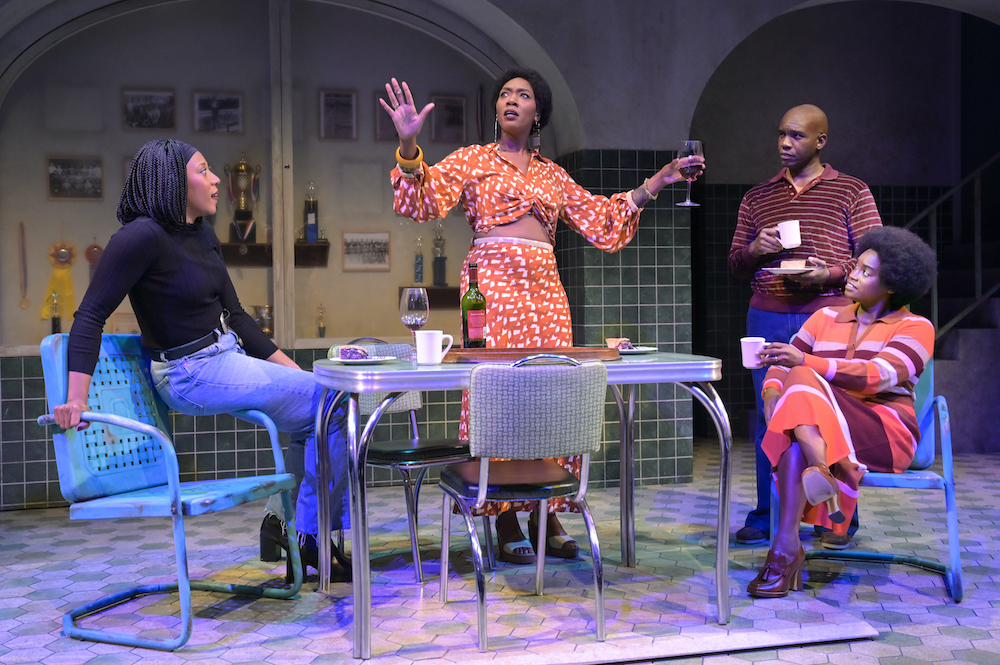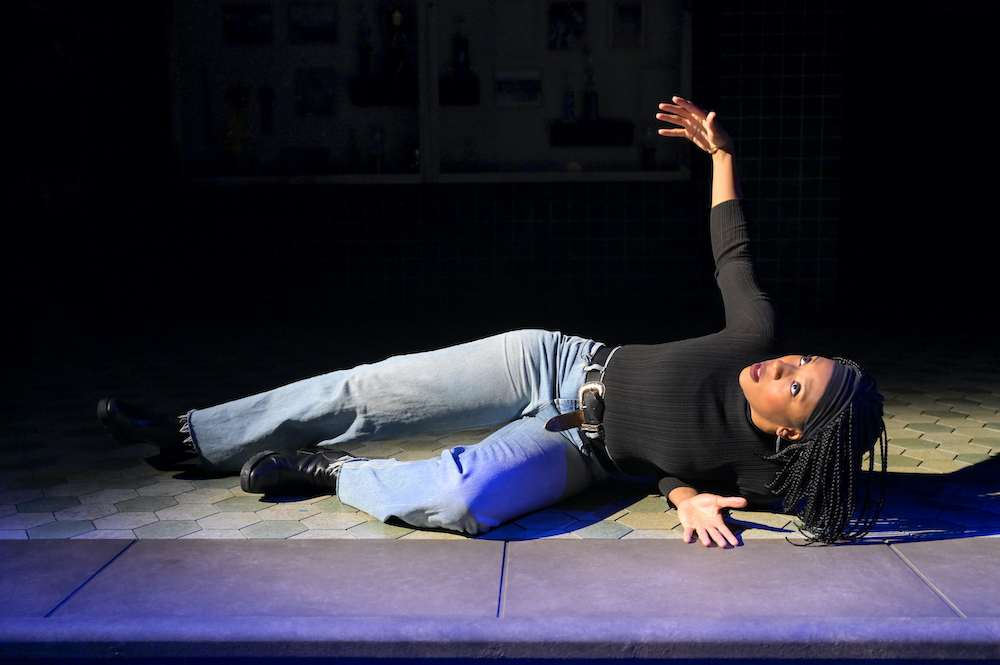Inherited trauma amongst Black folks is something of a recurring theme for Christina Anderson. It’s in her pharmaceutical thriller Inked Baby, it’s in her low-key drama pen/man/ship, and it’s in her supernatural reunion play Good Goods—the latter of which showcasing another common theme of Anderson’s: literal and figurative ghosts. That’s why it should come as no surprise that the ripple, the wave that carried me home (whose world premiere runs through October 16 at Berkeley Rep) follows suit with a tale of lost lives and opportunities set against the backdrop of an oft-overlooked chapter of both Black and US history.
The year is 1992. As the world awaits the outcome of the trial of Rodney King’s four attackers, wife and mother Janice (Christiana Clark) gets a phone call at the Ohio community center she runs with her husband. In fact, she gets several phone calls. All are from someone referred to as “Young Chipper Ambitious Black Woman” (Brianna Buckley), a sort of dark-skinned Stepford wife. The irritatingly-chipper woman is imploring Janice to return to their mutual hometown in Kansas, as they’re naming a new swimming center after her late father (Ronald L. Connor), who is renowned for his activism. But Janice is hesitant to do so. Returning home means seeing her estranged mother (Aneisa J. Hicks), acknowledging past traumas, and coming to terms with her hometown’s racist history.
The play highlights the unique role swimming pools played in the fight for civil rights. This is not something that gets mentioned or remembered much (unless you’re like me and recall the Disney Channel movie Perfect Harmony), but much like lunch counters and public transit, swimming pools were once segregated. So it’s no surprise when Janice hears of her father Edwin’s adolescent prank of having one of his friends jump into a “whites only” pool. They all high-tailed it before they got arrested, and later heard the pool was closed to be sanitized for several days afterward. This turns out to be the first of many acts of righteous rebellion on Edwin’s part, a trait he intentionally—sometimes, forcefully—tries to pass on to his daughter. So persistent was he, in fact, that his efforts have the opposite effect. Janice winds up having an interest in archeology, digging in the dirt, far removed from anything water-based.
But Edwin isn’t the only source of Janice’s would-be aquatic activism. Her mother Helen, whose own resistance leans more on hindsight rather than immediate passions, dreamed of one day creating and coaching the first all-Black swim team in her state, something she hoped would give birth to new generations of athletes. She teaches Janice to swim by the two of them sneaking (with the help of an employee) into an all-white pool. Their lessons end once the two are pulled over during a drive home, when a police encounter becomes a dignity-robbing experience.
This last event parallels to the Rodney King beating aren’t lost on us, particularly in those white talking heads who took to the news to say that King wouldn’t have had to be beaten if he had just complied. When white folks get pulled over, the most they expect is a ticket; when Black folks get pulled over, we’re hoping not to get shot.

Anderson’s play, while not perfect, is a refreshing balance of humor and pathos in its discussion of Black American trauma. Whereas Cal Shakes’ current production Lear awkwardly mashes tones and lacks almost any subtlety, the ripple allows different notes to co-exist, knowing that even in the most trying times, a surprising turn of events can relieve the pressure. What’s more, Anderson allows relationships to evolve just as organically, letting Janice’s recollections transform an elsewhere-revered man into the personification of all she hates about water. Her relationship with her mother is equally complex, with Janice never truly understanding the woman’s quiet dignity until she has children herself. In the meantime, Janice looks for a mother in her more free-spirited Aunt Gayle (also played by Buckley), whose archeological expertise rubs off on her protégé.
The text only really stumbles when it gets overly expository. Clark is a fine performer, particularly under the direction of Jackson Gay, but even she struggles with her introductory monologue. Both playwright and character are attempting an extensive level of world-building and historical scene-setting, but it all comes out in (no pun intended) a wave that’s overwhelming. Edwin’s recounting of his youthful prank is similarly thrown at us all at once, though its details are easier to grasp.
To the credit of the cast and crew—of the latter’s work it is particularly worth mentioning Todd Rosenthal’s intricately-detailed community pool set, with trophies behind faded glass, chlorine-rusted signs, and movable walls revealing more set pieces—they all find their groove pretty quickly. The empowerment of Edwin’s prank, the hilarity of the calls from the “YCABW,” and the silent indignity of Helen’s run-in with the police are handled with the right amount of care and emotion.

I saw the play the day after it opened in Berkeley Rep’s half-filled (perhaps a bit more) Peet’s Theatre. Everyone remained masked, and my Aranet4’s levels peaked at 616ppm over the course of 90-some-odd minutes of run time.
After she hears the King verdict read, and protests turn violent in LA (and San Francisco), Janice begins to think that naming a pool after her father is a welcome reprieve from a world gone mad. Perhaps life’s little victories are all we can expect these days? I wouldn’t agree with that, but I will say that the ripple, the wave that carried me home is a welcome distraction from a world more mad than ever.
THE RIPPLE, THE WAVE THAT CARRIED ME HOME runs through October 16. Berkeley Rep. Tickets and info here.
